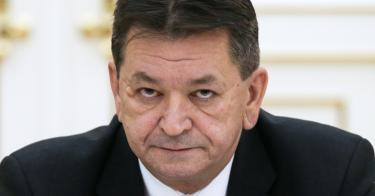Reports in the British press indicate that Alexander Prokopchuk, who has served in Russia’s Interior Ministry since 2003 and as Interpol’s Vice-Chair for Europe since 2016, will be elected as the new president of Interpol at the meeting of the Interpol General Assembly now taking place in Dubai. If accurate, this report raises fundamental questions for all democratic nations in Interpol.
The presidency of Interpol is vacant because of China’s arrest, detention, and disappearance of the now-former president, Meng Hongwei, a Chinese secret policeman. Since October, the office has been filled on an interim basis by South Korean official Kim Jong Yang, who is one of the two contenders from which the General Assembly will choose. The other, of course, is Prokopchuk.
At this point, there is no need to waste energy demonstrating that Russia is an abuser of the Interpol system. That charge has been amply proven already. Russia is certainly not the only abusive state, of course, but it is a major one, and Russian abuse is more significant because it has been so blatant, so often repeated, and is so clearly part of the wider and malevolent strategy of the Putin regime.
There is literally no one in the world who bears a more direct and personal responsibility for Russia’s abuse of Interpol than Alexander Prokopchuk . Since June 2011, he has been the head of Russia’s National Central Bureau, its NCB. Every Interpol member nation has an NCB, which is controlled by the member nation and which serves as the point of contact and conduit for all the information that flows between Interpol and the member nation.
In other words, every single abusive act that Russia has perpetrated through Interpol since June 2011 — the harassment of William Browder, of Estonian politician Eerik-Niiles Kross, of businessmen Igor Borbot and Alexey Kharis, and much more — was sanctioned directly by Prokopchuk. He had the clear and acknowledged responsibility under Interpol’s rules not to abuse its systems. But instead of stopping the abuse, he permitted it, facilitated it, and endorsed it. The abuse is his responsibility.
None of this is in any way secret. Russia’s abuse is no secret. Prokopchuk’s responsibility for it is no secret. And yet, if press reports are correct, a majority of the member nations of Interpol — acting through its one-nation, one-vote General Assembly — believe he is fit to be its President. The only possible explanation for this, if it comes to pass, is that a majority of those nations agree with Russia and China that Interpol is an instrument of power, not of law. In other words, they accept and welcome the abuse of Interpol because they abuse it, or plan to abuse it, themselves.
For years, I have argued that it would be wrong for the U.S. to quit Interpol. Its rules are good, and were written for us. The democracies pay most of Interpol’s budget, and have historically dominated its leadership. The election of Meng in 2016 showed that was changing. But the U.S. and democratic position, thanks to those rules and that budget, still struck me as a strong one. Since Interpol, unlike a lot of international organizations, does useful work, quitting it seemed a bad idea.
My argument was predicated on my belief that, if the U.S. and the other democracies asserted themselves, they could pull Interpol back into line. But if a majority of Interpol’s member nations are willing to put the Russian abuser-in-chief at the head of Interpol, that argument may have been wrong. There is no way that a law-abiding nation like South Korea should lose a vote in the Interpol General Assembly to Russia. If it does, we must recognize that Interpol may have passed beyond our ability to fix .
It is true that the president of Interpol does not run its day-to day-operations, so the election of Prokopchuk would be more important as proof of the way the winds are blowing than it would be as a risk to those operations. It may also be the case that the U.S. and other democracies have not yet fully awoken to the need to challenge the rising autocratic domination of Interpol, and that the election of Prokopchuk will be the necessary alarm bell. There is no reason to believe this, but it might be true.
But if Prokopchuk is elected, the idea of quitting Interpol and setting up a new organization, one with an entirely democratic membership, cannot be off the table any longer. At its core, Interpol rests on the belief — or the assumption — that its member nations are willing to abide by its rules. If a majority of them vote to elect Prokopchuk, that can only prove they do not care about those rules.
And since Interpol is ruled by majority vote, than might well mean that we have no chance of turning the situation around. If we come to that conclusion, the only alternative would be for the democracies to quit and create a competing organization. That is not yet an obviously correct alternative. It would certainly be undesirable. But so would be electing Russia’s abuser-in-chief to lead Interpol.
This piece originally appeared in Forbes https://www.forbes.com/sites/tedbromund/2018/11/18/the-election-of-russias-abuser-in-chief-to-lead-interpol-would-raise-fundamental-questions/#6c140afc5cda



